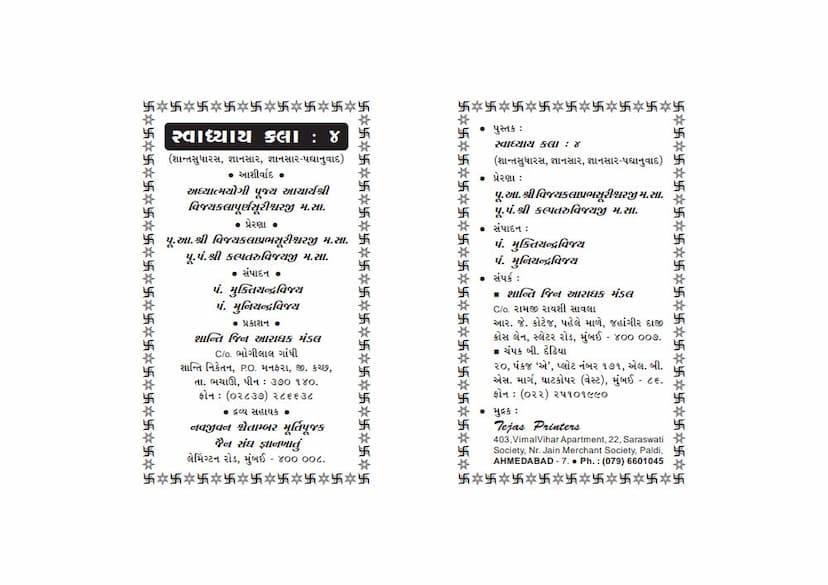Swadhyaya Kala 04
Added to library: September 2, 2025

Summary
This Jain text, "Swadhyaya Kala 04," published by Shanti Jina Aradhana Mandal Bhachau, is a compilation of profound teachings and reflections, primarily focused on the practice of swadhyaya (self-study) and the cultivation of virtuous qualities. The book is attributed to the inspirations of Pujya Acharya Shri Vijay Kalaprabh Surishwarji M.S. and Pujya Pandit Shri Kalpataru Vijayji M.S., with editing by Pandit Mukti Chandra Vijay and Muni Chandra Vijay.
The core message of the text, as articulated by Acharya Kalapurnasurishwarji, emphasizes the vital role of swadhyaya in the spiritual life of ascetics. It is not merely an activity to be performed during designated times but a continuous pursuit, akin to how a merchant constantly seeks profit. Each moment, when dedicated to swadhyaya, should be viewed as an opportunity for spiritual gain.
Key Themes and Teachings:
- The Purpose of Knowledge: The text stresses that knowledge is not meant for hoarding but for its application and dissemination. Just as wealth is meant to be shared, knowledge gains value when it is passed on to others. To withhold knowledge is likened to miserliness.
- The Seven Fruits of Swadhyaya: The book outlines seven significant benefits derived from diligent swadhyaya:
- Knowledge of self-interest (आत्महितज्ञानम्)
- Paramarthik (ultimate reality) Samvara (restraint) (पारमार्थिकः भावसंवरः)
- Growth of new enthusiasm from new knowledge (नूतनज्ञानात् अपूर्वसंवेगवृद्धिः)
- Steadfastness and unwavering resolve (निष्कम्पत्वम्)
- Excellent austerity (उत्कृष्टं तपः)
- Shedding of karmas (कर्म - निर्जरा)
- The power of instructing others (परोपदेश शक्तिः)
- The Importance of Transmission: The text strongly advocates for the continuation of knowledge transmission through teaching. A muni (monk) should not neglect a student seeking knowledge but should teach with compassion. This ensures the unbroken lineage of learning and the propagation of the Jain path.
- The Concept of Vinnyog (Application/Dissemination): It is highlighted that the true essence of knowledge is realized through its application and sharing. Knowledge, without being passed on, may not have continuity into future lives. The analogy of a flower spreading its fragrance after blooming is used to illustrate the importance of disseminating knowledge.
- The Value of Shrut Gnan (Scriptural Knowledge): Shrut Gnan is considered the seed from which the tree of spiritual progress grows. The text encourages the younger generation of monks and nuns to actively engage in learning and teaching, viewing complacency as a sin.
- Humility in Knowledge: While encouraging the pursuit of knowledge, the text also cautions against developing ego. Devotion to the divine is recommended as a means to maintain humility.
- Protection of Knowledge: The text draws a parallel between protecting acquired wealth and protecting acquired knowledge. Just as wealth can be lost through negligence, knowledge can also fade. The act of teaching others is presented as the most effective way to preserve and strengthen one's own knowledge.
- The Power of Study and Teaching: It is mentioned that through study and teaching, a muni can attain profound benefits, even potentially binding the Tirthankar (omniscient being) karma, as stated by Haribhadra Suri.
Structure and Content:
The book is structured into several chapters (प्रकाशः), each focusing on different aspects of spiritual practice and Jain philosophy, often presented as a series of verses or songs (गेयाष्टकम्) set to traditional melodies. These chapters cover various Bhavanas (contemplations) such as:
- Shant Sudharas (Essence of Peace/Nectar of Peace): Focuses on cultivating inner peace and detachment.
- Gyan Sar (Essence of Knowledge): Explores the nature and importance of right knowledge.
- Anitya Bhavana (Contemplation of Impermanence): Reflects on the transient nature of worldly things.
- Asharan Bhavana (Contemplation of Helplessness): Highlights the lack of true refuge in worldly possessions and relationships.
- Sansar Bhavana (Contemplation of the Cycle of Existence): Delves into the suffering inherent in the cycle of birth and death.
- Ekatva Bhavana (Contemplation of Oneness): Focuses on the inherent oneness of the soul.
- Anyatva Bhavana (Contemplation of Otherness): Emphasizes the distinction between the self and non-self.
- Ashuchi Bhavana (Contemplation of Impurity): Reflects on the impure nature of the physical body.
- Shrv Bhavana (Contemplation of Influx of Karmas): Discusses the causes of karmic bondage.
- Samvar Bhavana (Contemplation of Restraint): Explores methods to curb the influx of karmas.
- Nirjara Bhavana (Contemplation of Shedding of Karmas): Focuses on practices that lead to the removal of past karmas.
- Dharma Swakhyat Bhavana (Contemplation of True Dharma): Discusses the principles of righteous conduct.
- Lok Swarup Bhavana (Contemplation of the Nature of the Universe): Explores the structure and nature of the cosmos.
- Bodhi Durlabh Bhavana (Contemplation of the Rarity of Enlightenment): Underscores the difficulty of attaining spiritual awakening.
- Maitri Bhavana (Contemplation of Friendship): Promotes universal friendliness and compassion.
- Pramod Bhavana (Contemplation of Joy/Appreciation): Encourages finding joy in the virtues of others.
- Karuna Bhavana (Contemplation of Compassion): Fosters empathy and kindness towards all beings.
- Madhyasthya Bhavana (Contemplation of Equanimity): Emphasizes maintaining a balanced and impartial state of mind.
The text also includes a detailed exposition in the form of "Ashtakas" (groups of eight verses) by Mohopadhyaya Shri Yashovijay, covering various virtues and practices like Purnata (completeness), Magnata (absorption), Sthirta (steadfastness), Mohatyag (renunciation of delusion), Gyan (knowledge), Sham (tranquility), Indriyajaya (conquest of senses), Tyag (renunciation), and many more, culminating in a comprehensive guide to spiritual living within the Jain framework. The Gujarati padyanuvad (verse translation) of "Gyan Sar" at the end provides a lyrical rendition of these teachings.
Overall, "Swadhyaya Kala 04" serves as a practical manual for spiritual aspirants, offering deep insights and actionable guidance for achieving self-realization and liberation through diligent self-study, virtuous conduct, and the proper application of knowledge.